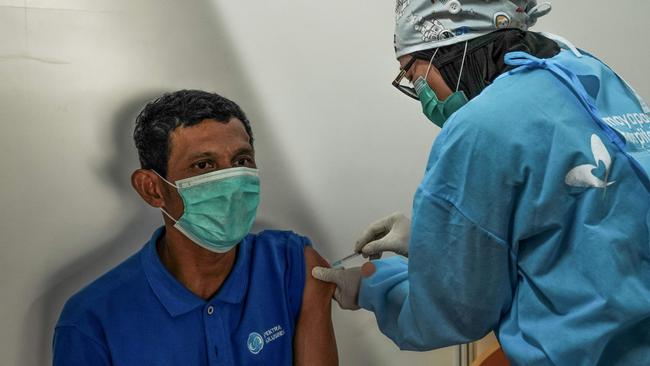Indonesian medics find China vaccine more effective in field
Thousands of Jakarta health workers inoculated with China’s Sinovac vaccine appear to be 100 per cent protected from dying from COVID-19, Indonesia’s health minister has said.

Thousands of Jakarta health workers inoculated with China’s Sinovac vaccine appear to be 100 per cent protected from dying from COVID-19, Indonesia’s health minister has said, citing a study of more than 25,000 medics for 28 days.
The findings are welcome news for Indonesia, the Southeast Asian nation hardest hit by the coronavirus but one of the fastest to roll out vaccines.
Health Minister Budi Gunadi Sadikin revealed details of the study among health workers in Jakarta that found it protected 96 per cent of recipients from hospitalisation and all from death as soon as seven days after the second jab. “We see a very, very drastic drop in hospitalisation and deaths among medical workers,” Mr Sadikin told Bloomberg.
The study conducted by Indonesia’s Health Research and Development Agency among health workers that had never been infected showed that less than 1 per cent of the vaccinated subjects developed any symptoms at all when they contracted COVID-19, while 8 per cent of those without the vaccine suffered symptoms.
This showed the Sinovac shot was more effective than suggested by its performance during clinical trials, where testing in Indonesia’s Padjajaran University showed an efficacy of 65.3 per cent.
Epidemiologist Pandu Riono, welcomed this as “good news” as Indonesia braces itself for a post holiday surge with millions of people leaving cities to spend the Islamic festival of Eid in their hometowns. More than half of motorists reportedly tested positive at hundreds of police checkpoints nationwide.
“It is encouraging to hear that the vaccine protects frontliners, who are most at risk of contracting COVID-19 due to their exposure to patients,” Dr Riono told The Australian.
The government must use this data to speed up its vaccination program as it “shows that the Sinovac vaccine reduces the likelihood of a severe infection”.
The Indonesian Medical Association said that there has been a significant decrease in infections and deaths among health workers over the last few months, but could not confirm this was a direct result of vaccinations. The association had said that among all Southeast Asian countries, Indonesia recorded the highest number of coronavirus fatalities among doctors with 366 deaths.
That trend “seems to be improving”, chairman Zubairi Djoerban said. “I have anecdotal evidence that some doctors contracted COVID-19 after their first shot, but were mostly asymptomatic and tested negative after self isolation.”
Last week, Jakarta’s health agency said it had vaccinated more than half of its targeted recipients since January, including all of its health workers and 64 per cent of the elderly population.
Governor Anies Baswedan has said he wanted at least three million people from the priority groups in the capital receive their double dose of vaccines by June, so the general population can get jabbed by July.
Indonesia has administered around 22 million doses of vaccines for its population but aims to achieve herd immunity by inoculating 181.5 million of its 270 million people this year in a nationwide vaccination drive that kicked off in January with President Joko Widodo taking the first dose of the Sinovac vaccine.
A Health Ministry spokeswoman said on Wednesday said that the apparent efficacy of the Sinovac vaccine should “reduce hesitancy” among those who haven’t had their jabs.
“We will speed up the vaccination process after Eid and hopefully we will reach our target of one million jabs per day,” Siti Nadia Tarmizi said.



To join the conversation, please log in. Don't have an account? Register
Join the conversation, you are commenting as Logout